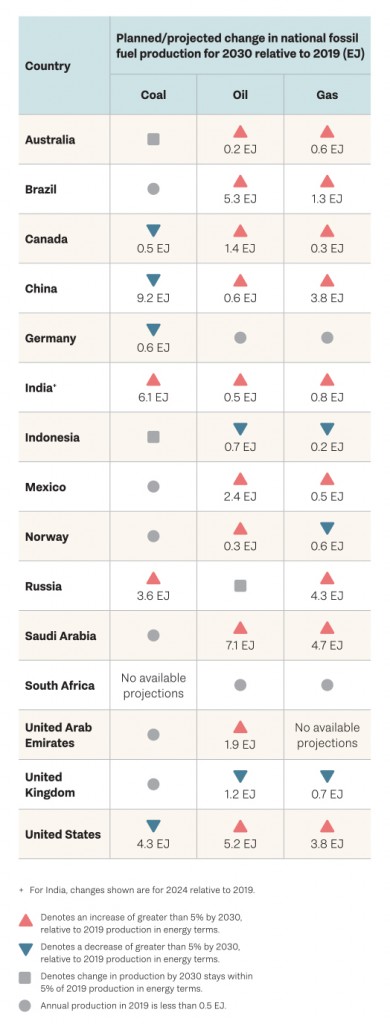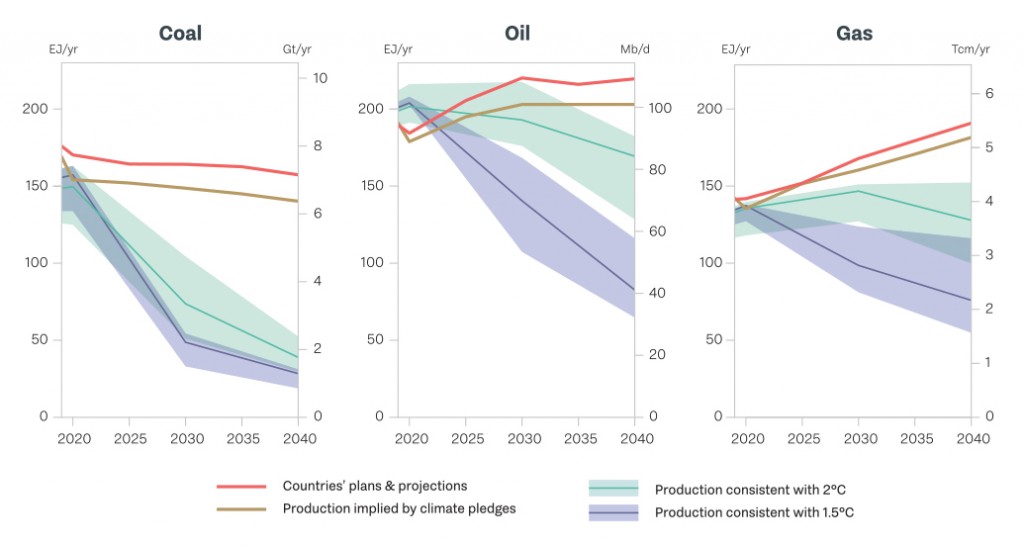Ahead of the crucial global climate change summit (COP26) in Glasgow that aims to encourage countries to take actions of limiting global temperature increases below 1.5 degrees Celsius, the United Nations has issued a sobering report this week saying that the world’s largest fossil fuel producers are still planning to ramp up production of coal, oil and gas in the coming years.
The startling findings of the 2021 Production Gap Report from the leading research institutes and the UN Environment Programme (UNEP), revealed that the world’s governments plan to produce around 110% more fossil fuels in 2030 than what would be necessary to limit warming to 1.5°C, and 45% more than consistent with 2 °C.
“ Recent announcements by the world’s largest economies to end international financing of coal are a much-needed step in phasing out fossil fuels. It is urgent that all remaining public financiers as well as private finance, including commercial banks and asset managers, switch their funding from coal to renewables to promote full decarbonization of the power sector and access to renewable energy for all,” UN Secretary General Antonio Guterres said in a statement.
The analysis looked at 15 major fossil fuel-generating countries including China, India, Indonesia, Australia, Brazil, Canada, Germany, Mexico, Norway, Russia, Saudi Arabia, South Africa, the United Arab Emirates, the United Kingdom and the United States. It noted that countries have given fossil fuels $300 billion worth of new funds since the start of the pandemic, that is more than they have towards clean energy.

Most major oil and gas producers are planning on increasing production out to 2030 or beyond, while several major coal producers are planning on continuing or increasing production. Credit: UNEP
“The devastating impacts of climate change are here for all to see. There is still time to limit long-term warming to 1.5°C, but this window of opportunity is rapidly closing,” said Inger Andersen, Executive Director of UNEP. “ At COP26 and beyond, the world’s governments must step up, taking rapid and immediate steps to close the fossil fuel production gap and ensure a just and equitable transition.”
Governments’ production plans and projections would lead to about 240% more coal, 57% more oil, and 71% more gas in 2030 than would be consistent with limiting global warming to 1.5°C.

In 2030, governments’ production plans and projections would lead to around 240% more coal, 57% more oil, and 71% more gas than would be consistent with limiting global warming to 1.5°C. Credit: UNEP
“ Global coal, oil and gas production must start declining immediately and steeply to be consistent with limiting long-term warming to 1.5°C. However, governments continue to plan for and support levels of fossil fuel production that are vastly in excess of what we can safely burn,” said Ploy Achakulwisut, lead author of the report from the Stockholm Environment Institute.
ADB’s new energy policy scrutinized
Coinciding with the release of the UN’s production gap report, the Asian Development Bank (ADB) said it has approved this month a new energy policy to support universal access to energy services that promotes low-carbon transition in Asia and the Pacific. However, environmental and civil society groups said that the new policy’s capacity to fully restrict coal financing activities and support a swift and just phase-out of coal in Asia and the pacific remains dubious.
ADB President Masatsugi Asawaka said that the new energy policy is a strong commitment that ADB will not fund new coal power production, adding that it has committed to deliver $100 billion in climate finance funds from 2019 to 2030 and will ensure that at least 75% of its projects will address climate change mitigation and adaptation by 2030.
“ Energy is central to inclusive socioeconomic development, but the expansion of energy systems has come at the cost of harmful impacts on our climate and environment. This new policy locks in our strong commitment that ADB will not fund new coal power production,” Asakawa explained.
ADB’s 2021 Energy Policy will guide ADB support to the region as it responds to these changes both in terms of energy access and scrutiny, and climate change and environmental sustainability.
While it is a step-up from the bank’s coal-friendly 2009 policy, research and advocacy organization Center for Energy, Ecology and Development (CEED) said existing loopholes and plans to support fossil gas cast clouds of doubt over ADB’s commitment to support climate and sustainability ambitions in Asia and the Pacific.
“ We welcome the affirmation made by ADB that it will no longer fund new-coal based power generation projects. This is a hard-earned victory of climate-vulnerable communities in the region, and a clear improvement from the 2009 policy which allowed ADB to promote the clean coal myth and turned the bank culprit to dirty, deadly and costly coal impacts,” said Gerry Arances, Executive Director of CEED.
“ At the same time, the coal buy-out scheme that ADB proudly says will assist member countries in phasing out coal actually risks unintentionally giving proponents of new coal projects confidence to proceed with their implementation while possibly providing a new lifeline for operating plants.”
ADB’s expressed support for gas in the new policy also threatens to overturn sustainability advances that it moves against coal potentially offer, Arances added.
“ By committing to fund gas, ADB places in peril any hope of stabilizing global temperature rise to no more than 1.5°C by the end of this century. Gas is a roadblock to the Philippines’ and Asia Pacific’s clean energy ambition, not a bridge towards it,” Arances said.

The UN Environment Programme’s (UNEP) Production Gap Report addresses the necessary decrease of the world’s production of fossil fuels in order to meet climate goals. credit: UNEP
Fossil fuel finance lacks clear policy?
A week before world leaders and diplomats gather in Glasgow for the COP26, the Asian Infrastructure Investment Bank (AIIB) announced that it will align its operations with goals of the Paris Agreement by July 2023 with finance projection of $50 billion by 2030. Environmental groups, however, view the bank lacks clear policy to stop funding new fossil fuel projects.
In a statement, the AIIB said enhancing investments in adaptation and resilience for low-income members and fostering emerging technologies to drive action on climate change are key focus areas of the multilateral bank’s plan.
Lidy Nacpil, Coordinator of the Asian Peoples’ Movement on Debt and Movement (APMDD) slammed the plan urging the AIIB to exclude in its Energy Sector Strategy and in all of its policies any support for projects related to the production and distribution of fossil fuels.
“ There is no room, no space and no time to build new fossil fuel projects. Most of AIIB’s financing is through the form of loans. We are calling on the bank to turn outstanding debts incurred through harmful fossil fuel-based projects, which constitute almost 50% of its energy portfolio, into grants for renewable energy projects,” Nacpil added.
This story was produced as part of the 2021 Climate Change Media Partnership, a journalism fellowship organized by Internews’ Earth Journalism Network and the Stanley Center for Peace and Security.
Cover photo: Climate activists protesting in front of the headquarters of Asian Development Bank to stop funding coal. Credit: AC Dimatactac
Latest posts by Imelda Abano (see all)
- Countries unlock multibillion-dollar fund to counter biodiversity crisis - August 26, 2023
- New World Bank report warns of climate inaction in the Philippines - November 14, 2022
- Climate change severely impacting global health, reports says - November 11, 2022
